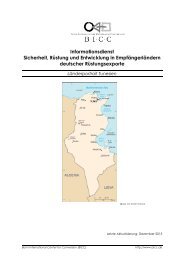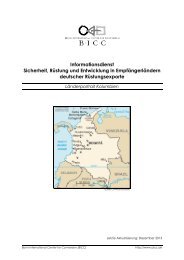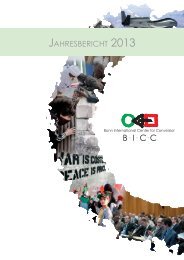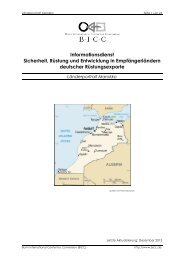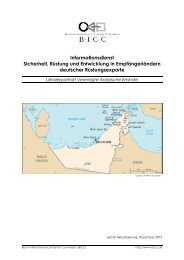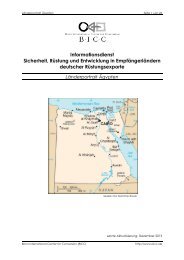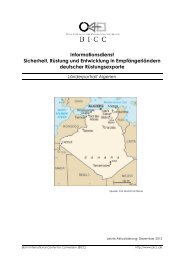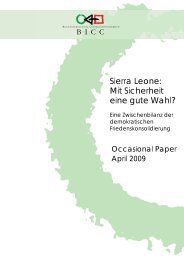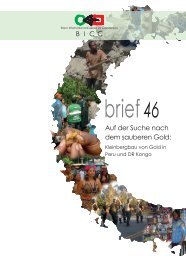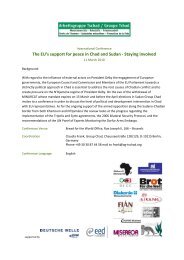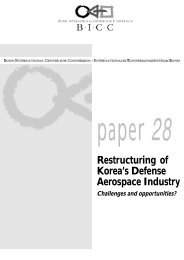English - BICC
English - BICC
English - BICC
Create successful ePaper yourself
Turn your PDF publications into a flip-book with our unique Google optimized e-Paper software.
decommissioning. The IICD also<br />
anticipated the creation of a timetable<br />
for decommissioning which would be<br />
worked out with paramilitaries; one<br />
which they would be “expected to<br />
adhere to” to ensure completion by<br />
May 2000 (Irish Times, 3 July 1999).<br />
These developments spurred the<br />
British and Irish governments into<br />
issuing a joint statement, The Way<br />
Forward document (see Irish Times, 3<br />
July 1999), which set out how<br />
decommissioning and devolution could<br />
be achieved. The Way Forward stipulated<br />
that the Executive would be set up and<br />
powers devolved to the Northern Irish<br />
Assembly in mid-July—an effective<br />
deadline. Shortly afterwards, “within<br />
days of devolution”, as Blair was to put<br />
it (Irish Times, 5 July 1999), the IICD<br />
would confirm a start to the process of<br />
decommissioning as defined in their<br />
report and have “urgent discussions”<br />
with the paramilitaries’ points of<br />
contact (Irish Times, 3 July 1999). The<br />
IICD would then specify that actual<br />
decommissioning was to start within a<br />
specified period. There was also a<br />
failsafe clause in that the governments<br />
promised to suspend the institutions<br />
of the Agreement, if commitments on<br />
either decommissioning or devolution<br />
were not kept. Regarding the former, it<br />
was to be left to the IICD to determine<br />
whether paramilitaries were fulfilling<br />
their commitments on<br />
decommissioning (Irish Times, 3 July<br />
1999).<br />
What did Unionism<br />
make of The Way<br />
Forward?<br />
In June, as a leaked UUP document<br />
showed, there had indeed been some<br />
debate about the possible merits of<br />
dropping the policy of prior<br />
decommissioning and instead adopting<br />
what it called Blair’s “preferred strategy<br />
of putting the main pressure for<br />
decommissioning onto Sinn Fein after<br />
devolution rather than prior to<br />
devolution” (Sunday Tribune, 4 July<br />
1999). The document argued that<br />
Republicans would be unlikely to<br />
actually decommission in the near<br />
future and would consequently incur<br />
blame for the lack of progress, putting<br />
the UUP in a favourable position. This<br />
argument did not however carry the<br />
day, as The Way Forward proposals were<br />
seen to be too vague and risky. As<br />
Trimble stated:<br />
“The demand of the IRA is government first<br />
and then, maybe guns. How can democrats in<br />
Britain, America and Ireland ask that we do<br />
this? If we agree to put democracy at the<br />
disposal of a secret cabal of committed<br />
terrorists, in advance of them giving up arms,<br />
we are not acting like democrats but like<br />
delinquents” (Sunday Times, 11 July 1999).<br />
The failsafe mechanisms were “flawed<br />
and unfair” whilst the<br />
decommissioning scheme was greatly<br />
weakened by the lack of an explicit<br />
timetable (Irish Times, 14 July 1999).<br />
The UUP would only countenance<br />
letting Sinn Fein into government<br />
without prior disarmament if two<br />
conditions were met. Firstly, if there<br />
was a default on decommissioning,<br />
Sinn Fein should be expelled rather<br />
than the institutions suspended, as at<br />
present the arrangements would<br />
“punish the good and guilty alike”.<br />
Secondly, the SDLP would have to<br />
commit themselves to supporting the<br />
Executive without Sinn Fein’s presence<br />
(Sunday Times, 11 July 1999). There was<br />
little likelihood of either condition<br />
being met, particularly given the<br />
SDLP’s view that the UUP was using<br />
the impasse to “bleed more<br />
concessions out of the governments.<br />
To bleed this process dry” (Irish Times,<br />
16 July 1999).<br />
Unionism did not feel that it had the<br />
room to manoeuvre on<br />
decommissioning, so it decided to<br />
stonewall. The knowledge that, in a<br />
recent European Parliament election,<br />
12 out of 13 Unionist voters had opted<br />
for parties with a ‘no guns, no<br />
government’ policy, may have weighed<br />
heavily in the UUP mind (Irish Times,<br />
19 July 1999).<br />
B·I·C·C<br />
guns and government<br />
The fact that these negotiations had<br />
taken place in the summer, Northern<br />
Ireland’s marching season and a time<br />
of especially heightened tension, did<br />
not help matters either. When the 15<br />
July came and the nominations were<br />
put forward to the Executive, Ulster<br />
Unionists stayed away. As only Nationalist<br />
and Republican ministers were<br />
nominated, the Executive contravened<br />
the Agreement’s rules on crosscommunity<br />
inclusivity and so<br />
immediately expired, in scenes<br />
reminiscent of a farce. Emotions ran<br />
high and there were bitter words from<br />
all sides in the following weeks as the<br />
blame game was played. With the<br />
Agreement stalled, the process now<br />
slipped into a period of review.<br />
The review: Autumn/<br />
Winter 1999<br />
There had been considerable emotional<br />
fallout in the weeks after the stillbirth<br />
of the Executive, a set of<br />
circumstances compounded by<br />
wrangling between Unionist, Nationalist<br />
and Republican over the release of<br />
the Patten Commission’s report on<br />
proposed policing structures. For<br />
Republicans, the proposed reforms did<br />
not go far enough but for Unionists,<br />
the proposals threatened the future<br />
security of Northern Ireland and<br />
represented a slap in the face to the<br />
Royal Ulster Constabulary’s record of<br />
service. Trimble described the report as<br />
a “shoddy piece of work” (Irish Times,<br />
10 September 1999). By the autumn, a<br />
recognition of harsh political realities<br />
had emerged. There was a growing<br />
sense that deflections or evasions from<br />
the goals of decommissioning and<br />
devolution could not be tolerated.<br />
Although the IRA had murdered a<br />
suspected informer and had been<br />
caught smuggling a sizeable quantity of<br />
arms from America, this did not<br />
automatically dishearten the British and<br />
Irish governments. Whilst they<br />
condemned these IRA actions, they<br />
appeared to accept that both the<br />
smuggling and the assassination had<br />
been approved by the Republican<br />
37



